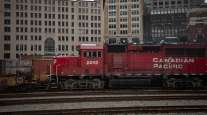Senior Reporter
Canadian Pacific-Kansas City Southern Merger Will Create 'Transformative' Network

[Stay on top of transportation news: Get TTNews in your inbox.]
Canadian Pacific Railway Ltd. envisions a “transformative” remaking of its freight-rail business after an announced merger with Kansas City Southern Railway that will create the first U.S.-Mexico-Canada network.
CP’s reach now will extend from Canada deep into Mexico, and from Vancouver, British Columbia, to St. John’s, Newfoundland.
Under the $25 billion deal announced March 21, Calgary, Alberta-based CP also will assume $4 billion of KCS’ debt.
The agreement will require regulatory review and eventual approval from the Surface Transportation Board. Officials from both Class I railroads said their respective boards of directors have given unanimous approval for the deal, which could take a year.

Creel
“This transaction will be transformative for North America, providing significant positive impacts for our respective employees, customers, communities and shareholders,” Keith Creel, CEO of CP, said in a statement.
“This will create the first U.S.-Mexico-Canada railroad, bringing together two railroads that have been keenly focused on providing quality service to their customers to unlock the full potential of their networks,” he added. “CP and KCS have been the two best-performing Class I railroads for the past three years on a revenue-growth basis.”
Of the five major freight railroads in the U.S., Kansas City Southern is the smallest, but it is the only carrier with operations in Mexico, running north-south through Texas and to its namesake city. Canadian Pacific has long sought a partnership with Kansas City Southern so it can extend its existing rail network from its home base in Calgary and the Midwest south.
Today we have entered into a merger agreement with Kansas City Southern that would join two historic railroads to create the first rail network connecting the U.S., Mexico and Canada.https://t.co/irU5Kzqdjo pic.twitter.com/P4yC1dbyLz — Canadian Pacific (@CanadianPacific) March 21, 2021
The new operation will be called Canadian Pacific Kansas City.
Creel said the adoption of the new U.S.-Mexico-Canada trade agreement was one of the main reasons behind the merger.
“The new competition we will inject into the North American transportation market cannot happen soon enough, as the new USMCA trade agreement among these three countries makes the efficient integration of the continent’s supply chains more important than ever before,” Creel said.

Bingham
Transportation economist Paul Bingham with IHS Markit told Transport Topics that of the Class I railroads, Kansas City Southern has been the one most likely to merge with another carrier, and the new three-nation trade agreement made the railroad a natural target.
“With the USMCA, there is reason to believe trade will continue to grow,” he said. “Where I believe it will have the most effect is actually the auto industry, with the increased domestic content rules that went into place last July. The majority of the additional vehicle manufacturing will likely be in Mexico, medium to long term. The CP will be in a position to carry some of those finished vehicles northbound and the auto parts southbound.”

Kansas City Southern Railway is the smallest of the five major freight railroads based in the U.S. (Kansas City Southern Railway)
The rail companies in a statement said the new single-line routes made possible by the transaction will mean more direct competition with the trucking industry, especially in the Midwest and South. In particular, they pointed to the Dallas-to-Chicago corridor as one where they aim to compete more aggressively for freight.
The combined network is expected to operate approximately 20,000 miles of rail, employ close to 20,000 workers and generate total revenue of about $8.7 billion based on 2020 results.
“I’ve had my eye on the KCS for quite some time,” Creel said. “We extend our reach for our customers through the U.S. and into Mexico, and at the same time KCS can do the same coming from Mexico up to U.S. destinations and Canada.”
The combination — the biggest purchase of a U.S. asset by a Canadian company since 2016 — would provide a transportation solution for manufacturers seeking to bring factories back to North America after the pandemic exposed risks of relying on overseas supply chains, Creel said.

Even before the pandemic, DHL's Larry S. Onge and Jim Monkmeyer set up strategies and implemented technology in order to respond to disruptions. Now, they know exactly how to get the vaccine from point A to point B — and, better, how to do it at a global scale. Hear a snippet, above, and get the full program by going to RoadSigns.TTNews.com.
The deal comes as trade across the three nations is expected to pick up under the Biden administration. Just days after his inauguration, President Joe Biden spoke with the leaders of Canada and Mexico, his first calls with foreign counterparts, during which issues from trade to climate change were discussed.
Mexico is a crucial supplier of vehicles, auto parts, electronics and food, and a major customer of grain, fuel and consumer goods.
Kansas City’s network linking Mexico’s largest industrial cities and ports to the Midwest would be positioned to benefit if the coronavirus pandemic and fraying ties between the U.S. and China prompt companies to move lower-wage manufacturing from Asia to North America.
“The combination of CP and KCS networks will offer unprecedented reach via new single-line hauls across the combined company’s continent-wide network,” officials said in a statement.
Bloomberg News contributed to this report.
Want more news? Listen to today's daily briefing below or go here for more info:



